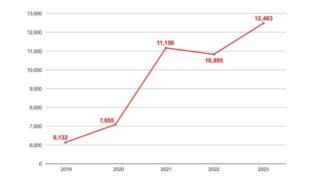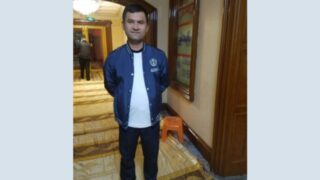While actively negating “rumors” of shrinking grain reserve, the government orders farmers to re-cultivate deserted farmlands, threatens to punish those who disobey.
by Deng Jie
As the fear of food shortages caused by the coronavirus outbreak and natural disasters started spreading across mainland China, the authorities immediately “refuted such rumors,” proclaiming that “China’s grain inventory can meet domestic demand for more than a year.”
Assured by the official reports, residents of a village in Guangzhou, the capital of the southern province of Guangdong, were surprised to get orders from the government to re-cultivate their deserted fields. “If there is sufficient stock of grain, why does the government force farmers to reclaim these farmlands?” a villager was puzzled. He was told to start cultivating the land he had not used for years within 13 days, or his farmland contractual rights would be revoked. Since farmland in China can only be owned collectively and is controlled by the state, farmers can only use it on contractual or management rights.


“The village committee organized a meeting on May 12 to tell us that the state had demanded to re-cultivate deserted farmlands,” a local farmer told Bitter Winter. “We’re not allowed to use them for anything else, like dig a fishpond, and can only grow grains. If we don’t, we have to give up these fields, and the government will use them as they like. The subsidies of 1,200 RMB [about $ 170] for an acre of farmland we receive now will also be canceled.”
“Those who have dug up fishponds and rented them, should break their contracts, refill these ponds with soil, and plant grains,” a local government employee explained. “They must do as the Communist Party demands!”
In an interview with Radio Free Asia, Mr. Chen, an official from Chongqing Municipality, said that in China, “various crises are erupting at the same time, and the political situation is turbulent.” He added that the government wants to stop importing US grain, “but there is a gap in the national grain reserve.” According to him, this makes the authorities worry about grain security, because all the means of stability maintenance may fail “once the grain is in short supply, although Chinese people will endure any adversity as long as they have food.”
A village official from Hangzhou, the capital of the eastern province of Zhejiang, also revealed to Bitter Winter that because of impending grain shortage, the local government withdrew contractual rights for all farmlands that had been deserted for two consecutive years. All land used for seedling nurseries, bamboo groves, fishponds, and other purposes should now be exclusively utilized for planting grains, beans, sweet potatoes, and other staple foods. Different cultures can be cultivated only with permissions from town and village authorities on the fields that do not meet the conditions for planting grains. Local government personnel conduct inspections daily. Once they discover a deserted field or land with no grains planted, farmers who use them are punished and ordered to destroy anything they grow and plant grains.


According to information on government’s websites, re-cultivating deserted fields is a priority now. However, official media reports don’t mention anything about grain crisis and only state that the policy is “to rejuvenate villages and help farmers out of poverty.”
This heavy-handed policy has caused great difficulties for many people. A farmer from Fushun county in Zigong, a prefecture-level city in the southwestern province of Sichuan, posted a video online explaining how resident of a village were demanded to re-cultivate all deserted fields within five days. Since most villagers are old, too weak, sick, or disabled to complete the task, their relatives living outside the village had to return home to work on the fields.
Similar demands are imposed all over the country. A villager from Guangdong Province told Bitter Winter that former village residents who had moved elsewhere had to return and cultivate their fields or hire somebody else. “Some of the fields have not been cultivated for more than ten years,” the man explained.


“The government beats around the bush and does not explicitly say that the state lacks grains, just orders farmers to cultivate their fields,” Ms. Liu, a villager from Guangdong Province, said. “They just conceal the truth and lie to the public fearing riots and political instability.”








